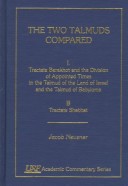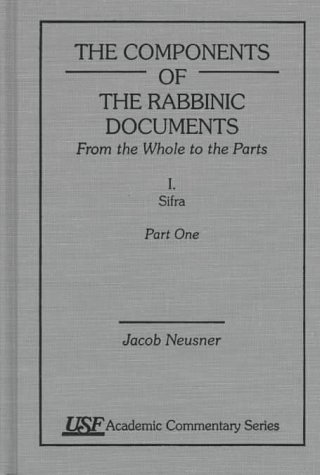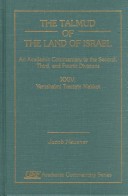Academic Commentary
1 primary work • 12 total works
Volume 4
The Components of the Rabbinic Documents, from the Whole to the Parts
by Jacob Neusner
The timid life of actor Felix Dern is uncorrupted by Hollywood, where his success has not yet been shackled with any intrusive fame. But in the theaters and the restaurants of his own city, "Lix" is celebrated and admired for his looks, for his voice, and for his unblemished private life. He has succeeded in courting popularity everywhere, this handsome hero of the left, this charming darling of the right, this ever-twisting weather vane.
A perfect life? No, he is blighted. He has been blighted since his teens, for every woman he sleeps with bears his child. So now it is Mouetta's turn. Their baby's due in May. Lix wants to say he feels besieged. Another child? To be so fertile is a curse...
In" Genesis, Jim Crace, winner of the National Book Critics' Circle Award and the Whitbread Novel of the Year, charts the sexual history of a loving, baffled man, the sexual emancipation of a city, and the sexual ambiguities of humankind.
The Components of the Rabbinic Documets, From the Whole to the Parts
by Jacob Neusner
The timid life of actor Felix Dern is uncorrupted by Hollywood, where his success has not yet been shackled with any intrusive fame. But in the theaters and the restaurants of his own city, "Lix" is celebrated and admired for his looks, for his voice, and for his unblemished private life. He has succeeded in courting popularity everywhere, this handsome hero of the left, this charming darling of the right, this ever-twisting weather vane.
A perfect life? No, he is blighted. He has been blighted since his teens, for every woman he sleeps with bears his child. So now it is Mouetta's turn. Their baby's due in May. Lix wants to say he feels besieged. Another child? To be so fertile is a curse...
In" Genesis, Jim Crace, winner of the National Book Critics' Circle Award and the Whitbread Novel of the Year, charts the sexual history of a loving, baffled man, the sexual emancipation of a city, and the sexual ambiguities of humankind.
The Components of the Rabbinic Documents, From the Whole to theParts
by Jacob Neusner
The timid life of actor Felix Dern is uncorrupted by Hollywood, where his success has not yet been shackled with any intrusive fame. But in the theaters and the restaurants of his own city, "Lix" is celebrated and admired for his looks, for his voice, and for his unblemished private life. He has succeeded in courting popularity everywhere, this handsome hero of the left, this charming darling of the right, this ever-twisting weather vane.
A perfect life? No, he is blighted. He has been blighted since his teens, for every woman he sleeps with bears his child. So now it is Mouetta's turn. Their baby's due in May. Lix wants to say he feels besieged. Another child? To be so fertile is a curse...
In" Genesis, Jim Crace, winner of the National Book Critics' Circle Award and the Whitbread Novel of the Year, charts the sexual history of a loving, baffled man, the sexual emancipation of a city, and the sexual ambiguities of humankind.
The Components of the Rabbinic Documents, From the Whole of the Parts
by Jacob Neusner



